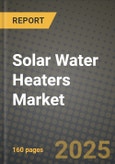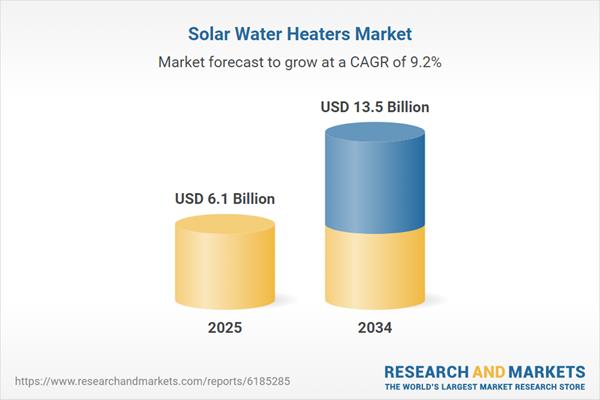The solar water heaters market is gaining steady traction worldwide, largely driven by the rising emphasis on renewable energy adoption and cost-effective domestic and industrial heating solutions. Solar water heaters (SWHs) utilize solar energy to heat water through a collector system, storing it for residential, commercial, or industrial use. These systems significantly reduce dependency on fossil fuels, cut down electricity bills, and contribute to greenhouse gas emissions reduction. With growing global awareness of environmental conservation and the benefits of clean energy technologies, solar water heaters have transitioned from niche alternatives to mainstream energy-efficient solutions. Government subsidies, tax incentives, and energy-saving mandates are accelerating their adoption, especially in regions with high solar radiation. Additionally, technological innovations are making these systems more durable, efficient, and adaptable to various climatic conditions, further expanding their applicability and appeal.
The solar water heater market experienced considerable growth driven by policy support, infrastructure development, and rising energy prices. Many countries, especially in Asia and Africa, introduced solar mandates in new residential and public housing projects, prompting builders to integrate solar water heating systems by default. The commercial segment - particularly hospitality, healthcare, and educational institutions - also saw increased adoption to reduce energy costs and meet sustainability targets. Innovations in flat plate and evacuated tube collector technologies made systems more efficient and resistant to temperature fluctuations. Additionally, hybrid systems combining solar water heaters with electric or gas backups gained popularity for ensuring continuous hot water supply during low sunlight periods. Manufacturers also began prioritizing compact and modular designs, making installations easier in urban environments with space limitations. As demand increased, collaboration between utility companies and private developers enabled more affordable financing options for consumers, enhancing market penetration even in middle-income segments.
The solar water heater market is expected to evolve further with a strong emphasis on smart integration and automation. Future systems will likely incorporate IoT capabilities for performance monitoring, automatic diagnostics, and remote control, providing users with better visibility and management of their energy consumption. There will be a push for more locally manufactured components to reduce dependency on imports and improve cost competitiveness, particularly in developing markets. Urbanization and climate change adaptation strategies will also influence product development, with innovations focused on high-efficiency systems that can operate in varied climatic zones, including cold or cloudy regions. Additionally, large-scale adoption is anticipated in institutional and industrial sectors as energy regulations become stricter and companies pursue aggressive decarbonization goals. Governments are also expected to expand subsidy programs and introduce public-private partnerships to scale rural access to solar water heating, aligning with clean energy goals and inclusive energy distribution policies.
Key Insights: Solar Water Heaters Market
- Integration of smart controllers and IoT-based monitoring is becoming common in solar water heaters, allowing users to track energy savings, schedule operations, and perform maintenance diagnostics remotely, enhancing usability and performance efficiency.
- Hybrid solar water heating systems that combine solar thermal technology with auxiliary electric or gas heating are gaining traction to provide consistent hot water even during periods of limited sunlight, ensuring reliability across different climates.
- Compact and modular system designs are trending, enabling easier rooftop installations and accommodating smaller urban residences where space is limited, making solar heating viable for a wider customer base.
- Growth in solar district heating and large-scale commercial installations is accelerating, particularly in hotels, hospitals, and schools where hot water demand is high and consistent, offering long-term energy and cost savings.
- Manufacturers are shifting focus toward environmentally friendly materials and recyclable components in collector and tank systems to align with sustainability targets and reduce the carbon footprint of the product lifecycle.
- Supportive government policies, including subsidies, tax rebates, and mandatory solar integration in building codes, are incentivizing both residential and commercial consumers to adopt solar water heating systems.
- Rising electricity and gas prices are making conventional water heating solutions less attractive, prompting households and businesses to switch to solar alternatives that offer long-term operational cost savings.
- Increased awareness about environmental issues and the need to reduce carbon emissions are motivating eco-conscious consumers and businesses to invest in clean energy technologies like solar water heaters.
- Expanding construction activity, particularly in emerging economies, is creating a demand for energy-efficient and sustainable utilities, with solar water heating systems being a practical and cost-effective solution for hot water needs.
- The high upfront installation cost remains a major barrier, especially in low-income or price-sensitive markets. Despite long-term energy savings, the initial expense of system components, installation, and auxiliary infrastructure can deter adoption without adequate financial incentives or support mechanisms.
Solar Water Heaters Market Segmentation
By System
- Thermosiphon
- Pumped
By Collector
- Evacuated Tube Collector
- Flat Plate Collector
- Unglazed Water Collector
By Capacity
- 100 L
- 150 Liter
- 200 Liter
- Other Capacity
By Application
- Residential
- Commercial
- Industrial
Key Companies Analysed
- Robert Bosch GmbH
- Hubbell Incorporated
- Viessmann Manufacturing
- Ariston Group
- Rheem Manufacturing Company
- Stiebel Eltron Inc.
- Tata Power Solar Systems Limited
- V-Guard Industries Ltd.
- Bradford White Corporation
- Himin Solar Energy Group
- Photon Energy Systems Ltd.
- A. O. Smith
- Central Electronics Limited
- Alternate Energy Technologies LLC
- Kodsan Isi Teknolojileri
- SunEarth Inc.
- Apricus Solar Co. Ltd.
- Jupiter Solar Power Limited
- SunTank
- Solav Energy
- Ferroli S.p.A.
- FAFCO Inc.
- Wagner & Co Solartechnik GmbH
- Chemtrols Solar Pvt. Ltd.
- Nihon Itomic Co. Ltd.
Solar Water Heaters Market Analytics
The report employs rigorous tools, including Porter’s Five Forces, value chain mapping, and scenario-based modeling, to assess supply-demand dynamics. Cross-sector influences from parent, derived, and substitute markets are evaluated to identify risks and opportunities. Trade and pricing analytics provide an up-to-date view of international flows, including leading exporters, importers, and regional price trends.Macroeconomic indicators, policy frameworks such as carbon pricing and energy security strategies, and evolving consumer behavior are considered in forecasting scenarios. Recent deal flows, partnerships, and technology innovations are incorporated to assess their impact on future market performance.
Solar Water Heaters Market Competitive Intelligence
The competitive landscape is mapped through proprietary frameworks, profiling leading companies with details on business models, product portfolios, financial performance, and strategic initiatives. Key developments such as mergers & acquisitions, technology collaborations, investment inflows, and regional expansions are analyzed for their competitive impact. The report also identifies emerging players and innovative startups contributing to market disruption.Regional insights highlight the most promising investment destinations, regulatory landscapes, and evolving partnerships across energy and industrial corridors.
Countries Covered
- North America - Solar Water Heaters market data and outlook to 2034
- United States
- Canada
- Mexico
- Europe - Solar Water Heaters market data and outlook to 2034
- Germany
- United Kingdom
- France
- Italy
- Spain
- BeNeLux
- Russia
- Sweden
- Asia-Pacific - Solar Water Heaters market data and outlook to 2034
- China
- Japan
- India
- South Korea
- Australia
- Indonesia
- Malaysia
- Vietnam
- Middle East and Africa - Solar Water Heaters market data and outlook to 2034
- Saudi Arabia
- South Africa
- Iran
- UAE
- Egypt
- South and Central America - Solar Water Heaters market data and outlook to 2034
- Brazil
- Argentina
- Chile
- Peru
Research Methodology
This study combines primary inputs from industry experts across the Solar Water Heaters value chain with secondary data from associations, government publications, trade databases, and company disclosures. Proprietary modeling techniques, including data triangulation, statistical correlation, and scenario planning, are applied to deliver reliable market sizing and forecasting.Key Questions Addressed
- What is the current and forecast market size of the Solar Water Heaters industry at global, regional, and country levels?
- Which types, applications, and technologies present the highest growth potential?
- How are supply chains adapting to geopolitical and economic shocks?
- What role do policy frameworks, trade flows, and sustainability targets play in shaping demand?
- Who are the leading players, and how are their strategies evolving in the face of global uncertainty?
- Which regional “hotspots” and customer segments will outpace the market, and what go-to-market and partnership models best support entry and expansion?
- Where are the most investable opportunities - across technology roadmaps, sustainability-linked innovation, and M&A - and what is the best segment to invest over the next 3-5 years?
Your Key Takeaways from the Solar Water Heaters Market Report
- Global Solar Water Heaters market size and growth projections (CAGR), 2024-2034
- Impact of Russia-Ukraine, Israel-Palestine, and Hamas conflicts on Solar Water Heaters trade, costs, and supply chains
- Solar Water Heaters market size, share, and outlook across 5 regions and 27 countries, 2023-2034
- Solar Water Heaters market size, CAGR, and market share of key products, applications, and end-user verticals, 2023-2034
- Short- and long-term Solar Water Heaters market trends, drivers, restraints, and opportunities
- Porter’s Five Forces analysis, technological developments, and Solar Water Heaters supply chain analysis
- Solar Water Heaters trade analysis, Solar Water Heaters market price analysis, and Solar Water Heaters supply/demand dynamics
- Profiles of 5 leading companies - overview, key strategies, financials, and products
- Latest Solar Water Heaters market news and developments
Additional Support
With the purchase of this report, you will receive:- An updated PDF report and an MS Excel data workbook containing all market tables and figures for easy analysis.
- 7-day post-sale analyst support for clarifications and in-scope supplementary data, ensuring the deliverable aligns precisely with your requirements.
- Complimentary report update to incorporate the latest available data and the impact of recent market developments.
This product will be delivered within 1-3 business days.
Table of Contents
Companies Mentioned
- Robert Bosch GmbH
- Hubbell Incorporated
- Viessmann Manufacturing
- Ariston Group
- Rheem Manufacturing Company
- Stiebel Eltron Inc.
- Tata Power Solar Systems Limited
- V-Guard Industries Ltd.
- Bradford White Corporation
- Himin Solar Energy Group
- Photon Energy Systems Ltd.
- A. O. Smith
- Central Electronics Limited
- Alternate Energy Technologies LLC
- Kodsan Isi Teknolojileri
- SunEarth Inc.
- Apricus Solar Co. Ltd.
- Jupiter Solar Power Limited
- SunTank
- Solav Energy
- Ferroli S.p.A.
- FAFCO Inc.
- Wagner & Co Solartechnik GmbH
- Chemtrols Solar Pvt. Ltd.
- Nihon Itomic Co. Ltd.
Table Information
| Report Attribute | Details |
|---|---|
| No. of Pages | 160 |
| Published | October 2025 |
| Forecast Period | 2025 - 2034 |
| Estimated Market Value ( USD | $ 6.1 Billion |
| Forecasted Market Value ( USD | $ 13.5 Billion |
| Compound Annual Growth Rate | 9.2% |
| Regions Covered | Global |
| No. of Companies Mentioned | 25 |









